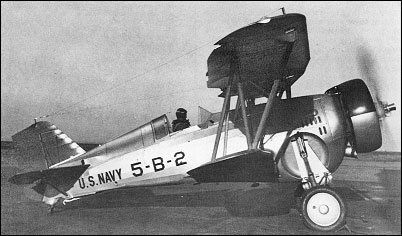|
| The fourth production F11C-2 (Goshawk) was completed
with manually-operated retractable main undercarriage
members accommodated by a deepened forward
fuselage. It was powered by an R-1820-80
Cyclone rated at 700hp at 2440m, and was
delivered to the US Navy on 27 May 1933 as the
XF11C-3. Twenty-seven production models were
ordered as F11C-3s with raised aft turtle decks, partial
canopies and the metal wings that had proved satisfactory
on the XF11C-1. Prior to the commencement of
deliveries on 7 October 1934, the designation was
changed to BF2C-1. The BF2C-1 carried an armament of
two 7.62mm Brownings and made provision for
a single 215kg bomb or up to four 53kg
bombs. An R-1820-04 Cyclone rated at 770hp for takeoff
was fitted. In the event, at cruising rpm the Cyclone set up a sympathetic vibration with the metal wing
structure, the aircraft shaking dramatically in this
regime, and, the problem never being satisfactorily resolved,
the BF2C-1s were withdrawn within a few
months.
| WEIGHTS |
| Take-off weight | 2066 kg | 4555 lb |
| Empty weight | 1529 kg | 3371 lb |
| DIMENSIONS |
| Wingspan | 9.60 m | 32 ft 6 in |
| Length | 7.01 m | 23 ft 0 in |
| Height | 3.30 m | 11 ft 10 in |
| Wing area | 24.34 m2 | 261.99 sq ft |
| PERFORMANCE |
| Max. speed | 362 km/h | 225 mph |
| Range | 917 km | 570 miles |
| Klaatu83, e-mail, 01.04.2012 15:15 The U.S. Navy version of this proved a failure due to sympathetic vibrations induced by the engine into it's metal wings at cruising speeds. However, the wooden-winged export version did not experience that problem, and proved very successful. Many were sold abroad as the "Hawk III", and some saw combat with the Air Forces of countries such as China and Thailand. reply | | beihuaguo, 20.06.2011 12:01 A fine gentleman and an enjoyable experience, although 1 adult and 3 HS students barely fit in the cabin. reply | | Robin, e-mail, 10.05.2011 20:36 Tom, Having an intense interest in Golden Age military aviation and having built numerous models of the period, the Hasegawa 1 /32 is a great project, but a bit demanding at times. I have one second in the queue right now. Slow and steady gets them done. A great way to secure rigging into holes is a straight pin with the tiniest drop of medium CA on the tip. Just snag the line a and push it a bit like 1 /16" into the hole and leave it a couple of hours. Give the pin a little twist and pull it out. Voila! secured rigging. Plain old Testors silver 1146 thinned for airbrushing is the best (closest to authentic color) for the wings I've found, but aluminum on the fuse is good. Good luck and enjoy. The variant used by VB-2 was a F11C-2 or BFC2 in use from '33 to about late '37 to '38 reply | | tom cartwright, e-mail, 25.11.2010 10:08 I am just about to start assembling my Hasegawa 1 /32 scale model of this aircraft, it looks interesting,to say the least. Getting that rigging right looks to be a bit of a challenge. So I will take my time, and get it right. reply | |
| | Leo Rankin, e-mail, 14.09.2010 12:48 Boming Squadron 2 flew an airplane like this from USS Lexington but did not have retractable landing gear, had tear drop shaped fairings over the main gear wheels, Time 1938-1939 reply | | Charm Pandora, e-mail, 29.06.2010 21:45 I got to fly out of Wiley Post airport several times in a Sundowner. Mr. Carter, my instructor, was a retired USAF pilot. A fine gentleman and an enjoyable experience, although 1 adult and 3 HS students barely fit in the cabin. reply | | Rafael Alba Vega, e-mail, 04.01.2010 19:12 I decided to make a model of this airplane, but the planes are of poor quality game, I would find some level if possible in digital format, even a triptych with the three views, for from it, making the plane the desired scale. Les agradeceria mucho provide me where I can get.
Sincerely reply |
|
Do you have any comments?
|
| 
COMPANY
PROFILE
All the World's Rotorcraft
|






